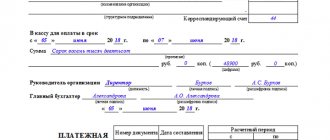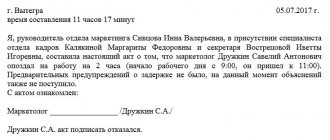Is an employer obligated to punish its employees?
Many employers are convinced that disciplinary action is a reprimand with a warning.
This is not entirely true. The Labor Code of the Russian Federation specifies two types of disciplinary liability:
- general - applies to all employees in accordance with labor legislation;
- special - established by charters and regulations on discipline for individual services.
Common types of punishment include reprimand, reprimand, dismissal.
Special responsibility applies to employees of certain services. These are mainly civil servants and military personnel. These punishments (for example, compulsory labor, a warning, a reprimand, a reprimand, compensation for damages) are determined by the statutes and regulations on discipline approved by federal laws (Article 189 of the Labor Code of the Russian Federation).
Special disciplinary sanctions, found in almost all discipline provisions, are a reprimand, a warning, and dismissal for appropriate reasons.
What to do if you need to punish, but not too much? The Labor Code provides that issuing a disciplinary sanction is the employer’s right, not an obligation. Thus, the employer independently decides whether to punish the employee or use, for example, a verbal warning as a disciplinary sanction.
How to reprimand for improper performance of official duties
The official issuance of a reprimand is a legal fact, so this procedure must be properly formalized. The Labor Code of the Russian Federation and other federal regulations do not contain regulations that would determine how a reprimand is issued, but, based on practice, this action is recommended to be carried out according to the following algorithm:
- Firstly, the employer must document the fact of failure (or incorrect performance) by the employee of his duties. Most often, this is done by sending a memo to the director of the company by the immediate supervisor of the employee who committed the misconduct. An offense can also be recorded using a report drawn up by a commission formed by the head of the company to evaluate the employee’s actions.
- Secondly, the employer, before issuing a reprimand, must give the employee the opportunity to explain the actions he committed. To do this, it is necessary to send the employee a notice of the submission of an explanatory note.
- Thirdly, the employer needs to wait 2 days - this is how much time the employee has to draw up an explanatory note (Article 193 of the Labor Code of the Russian Federation). If he does not do this, the employer should draw up a corresponding act. Further (and also in the event that an explanation is presented, but the employee’s arguments do not look convincing), a reprimand can already be issued.
A reprimand is issued by issuing an order signed by the head of the company.
The order to issue a reprimand must:
- indicate that all the documents that we mentioned above are attached to it: a memorandum of misconduct (or an act of the commission), a notice of the need to submit an explanatory note, the explanatory note itself or an act of failure to submit it;
- indicate the dates and names of the relevant documents.
The order to issue a reprimand must be signed by:
- head of the company;
- by the employee himself within 3 days from the date of drawing up the order.
If the employee refuses to sign the document, it will be necessary to draw up a report about this (Article 193 of the Labor Code of the Russian Federation).
Information about the reprimand of an employee can be recorded in the personal file.
Is it possible not to punish a crime at all?
When making a decision on an employee’s misconduct, the employer is obliged to take into account the severity of the violation and its consequences, the circumstances that led to the commission of the violation, the previous characteristics of the employee and his behavior, since all of the above are the principles of validity and fairness for all types of legal liability.
The employer not only decides what punishment to apply to the employee (warning, reprimand, dismissal), but also if, during the collection of information about the incident, he decides not to punish the employee, the inspection authorities will not make any claims against him. Since a warning to an employee is a disciplinary sanction of the mildest form. It should be remembered that one offense can only be punished once. And if a warning has already been given, then it is impossible to announce a reprimand or other punishment for the same sin.
Is it possible to warn a person and how?
A reprimand and warning are the most common sanctions for violations of work discipline. Let's consider: a warning and a reprimand - what is the sequence of application of these measures. A warning is the mildest form of punishment, applied for minor violations of labor discipline, and is a type of sanction such as a reprimand. A reprimand is a fairly serious punishment, as it may be the reason for further dismissal.
Typically, a warning is issued in writing based on the facts of the investigation into the violation. But the regulations on discipline may also provide for the oral form of imposing such a measure.
However, a warning at work has quite serious consequences. The presence of several warnings may be grounds for a reprimand, and two or more reprimands will lead to dismissal. In addition, the regulatory documents of the institution may provide for the impact of punishment on the material component, for example, a reduction in the size of the bonus.
How is dismissal formalized?
There must be compelling reasons to impose this penalty. Additionally, you need to format it correctly.
An act of theft is necessarily formed, and an explanatory statement is also required from the violator himself. The opportunity to draw up an explanatory note is provided only within two days.
A penalty represented by dismissal must be drawn up in the form of an order. A copy of this document is provided to the employee for review. Based on this order, an order to dismiss the employee is issued. The citizen receives a salary and compensation for vacation, and information is entered into the work book that the employee was fired after committing a disciplinary offense.
It will not be possible to fire a person if he is on vacation or sick leave.
Is a warning a disciplinary sanction?
The most common punishments applied to an employee are a reprimand, warning, reprimand, disqualification, and fine. But not all of them relate to punishments for violation of work discipline.
A reprimand and reprimand are disciplinary sanctions prescribed in the Labor Code of the Russian Federation. The legislation of the Russian Federation classifies the other listed measures as administrative.
But there is an exception. Charters and regulations on discipline for employees of certain services, approved at the state level, provide for additional penalties: warning, compensation for damages, disqualification, reprimand, severe reprimand, deprivation of honorary signs and titles, etc. Therefore, disputes about whether a warning is disciplinary action or not continues.
If the organization belongs to services that have a discipline statute approved at the state level, then the employer can use a type of punishment such as a warning in the form of a penalty. In addition, if the organization has developed and approved a discipline regulation that specifies such a punishment, then it can also be applied to the violator. But in this case, the warning will no longer be a measure of disciplinary action, but a measure of disciplinary action.
Read more: Procedure for applying disciplinary action
Features of compilation
In case of disagreement with the applied measure of responsibility, the employee can appeal the management’s decision in court. The legislation allows 3 months for this. The employee draws up a corresponding statement, which sets out the essence of the incident and indicates what exactly he does not agree with. The head of the enterprise must assume that the employee will take such a step. However, as practice shows, a reprimand, unlike dismissal, is practically not challenged in court. In any case, the likelihood of the employee’s claim being satisfied will be minimized if there is documentary evidence of the employer’s actions.
Illegality of the sanction
As stated above, the offender should be asked to provide a written explanation. As with the signature of the act, it is impossible to require the employee to provide explanations. This is an employee's right. He may not use it. The employer’s right to ask for an explanation from an employee is established by Articles 192 and 193 of the Labor Code. These norms regulate the actions of the manager. The request for the employee to provide a written explanation is set out in the notice. It is delivered to the offender against signature. After this, the violator must also respond in writing within two days. If the employee does not sign the notification, a report about this is drawn up.
Repeated offense is another matter. This is understood as an offense committed again after a certain time has passed after the suppression of a similar offense. Let's take the same example. After being reprimanded for untimely preparation of reports for the first quarter, the employee prepared the reports within the time limits established by the order (instruction) on the application of disciplinary action. When preparing reports for the second quarter, the employee again violated the deadlines for preparing reports, that is, he committed a similar offense. In this case, the employer cannot use the above clarification of the Supreme Court of the Russian Federation.
Until 1863 (the reforms of Alexander II), corporal punishment was used not only against serfs, but also against hired workers, journeymen, and students. Their rights in Russian factories and factories were not regulated by any acts until 1886 (before the introduction of the decree “On the supervision of factory industry establishments and on the mutual relations of factory owners and workers”). However, cases of punishing workers with whips and rods occurred until the end of 1905. Only with the first Soviet decrees was corporal punishment finally abolished, and education through persuasion was proclaimed as the main method of dealing with discipline violators. Over time, the Soviet state reconsidered such a loyal attitude towards disciplinary offenses, and in 1940 (June 26) the Decree of the Presidium of the Supreme Soviet of the USSR was issued “On the transition to an 8-hour working day, to a 7-day working week and on the prohibition of unauthorized departure of workers and employees from enterprises and institutions." This act established judicial (!) liability: “for absenteeism without a valid reason, workers and employees of state, cooperative and public enterprises and institutions are brought to trial and, by a verdict of the people’s court, are punished by corrective labor at the place of work for up to 6 months with deduction from wages.” fees up to 25%." People's judges who considered such cases individually (without the participation of people's assessors) were ordered to resolve them within no more than 5 days and to carry out sentences in these cases immediately. In addition, directors of enterprises and heads of institutions were also brought to justice for failing to bring to trial those guilty of absenteeism without good reason. By the way, being more than 20 minutes late was then equivalent to absenteeism. Judicial liability in the form of correctional labor was abolished only in 1956.
We recommend reading: Payments for a Second Child in 2021 in Moscow
"Don't forbid"
In order for the disciplinary procedure to be manageable at the employer level, the latter should not prohibit employees from appealing the actions of their immediate superiors. Such a prohibition in relation to jurisdictional bodies (courts, federal labor inspection) is illegal, and in relation to higher officials of the organization - it only limits the opportunity to resolve the dispute without leaving the organization.
When hiring a person, the employer expects him to fulfill the duties and standards adopted by the enterprise and established by law. If internal regulations are violated and a negligent attitude towards duties is revealed, the employer has the right to apply disciplinary punishment.
Is it possible to develop your own collection system?
There is no direct prohibition on the employer’s approval of regulatory documents that will spell out penalties for violations of labor discipline. But the organization cannot establish additional penalties on its own. In this situation, it is possible to prescribe sanctions for violations of discipline. These may include a stern warning or punishment in the form of reprimand or control. But in any case, the sanctions should be milder than the sanctions specified in labor legislation, since their main goal is to help the employee cope with his shortcomings and develop respect for the rules of the organization.









